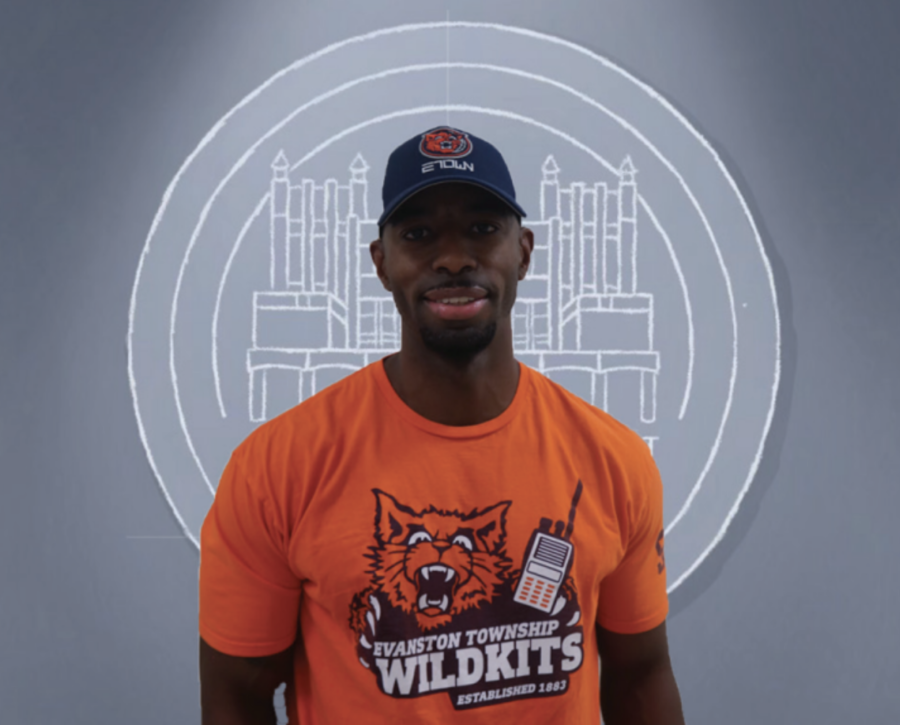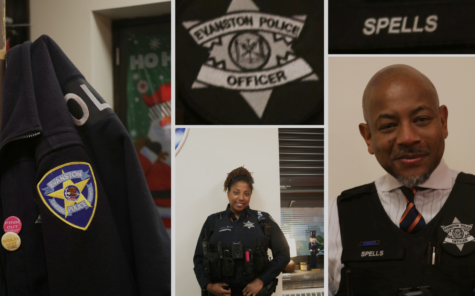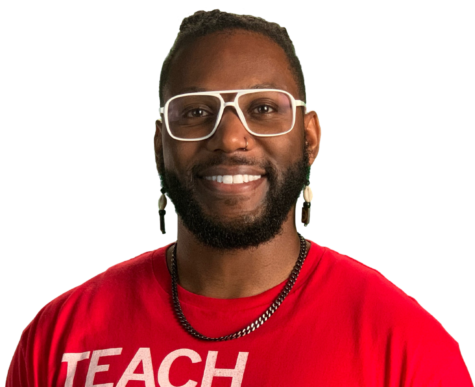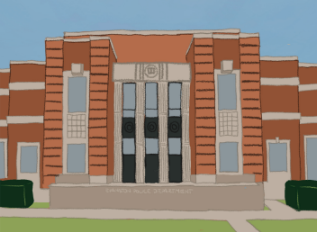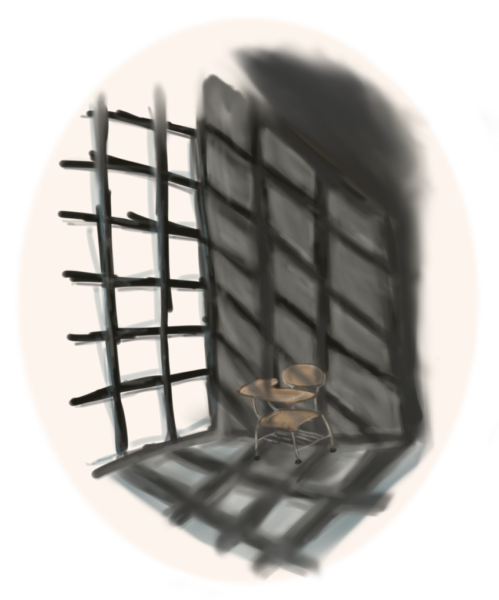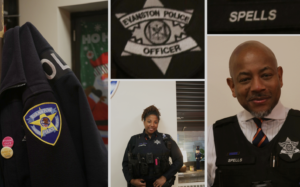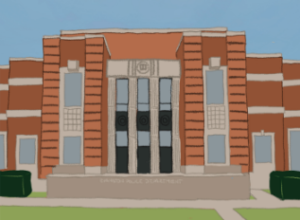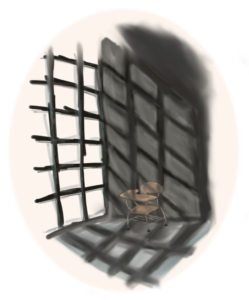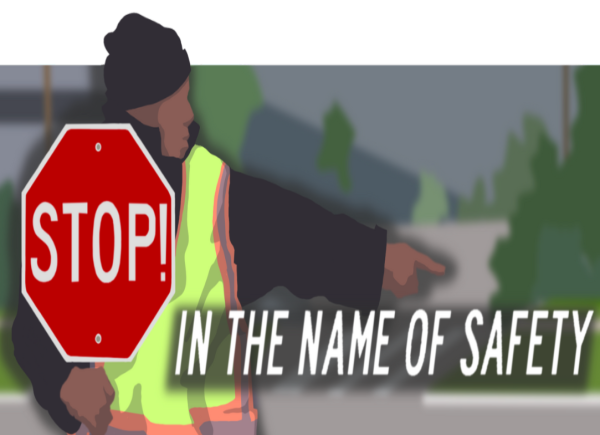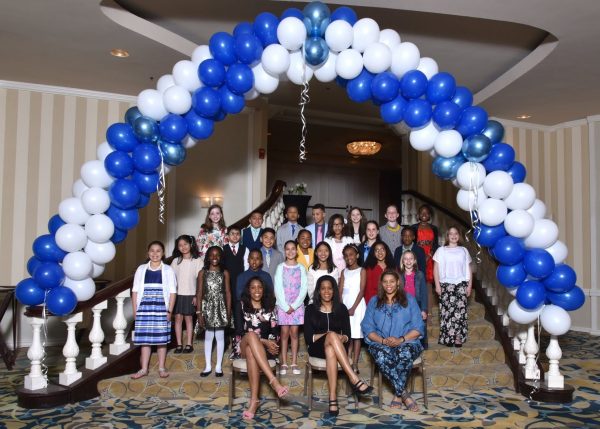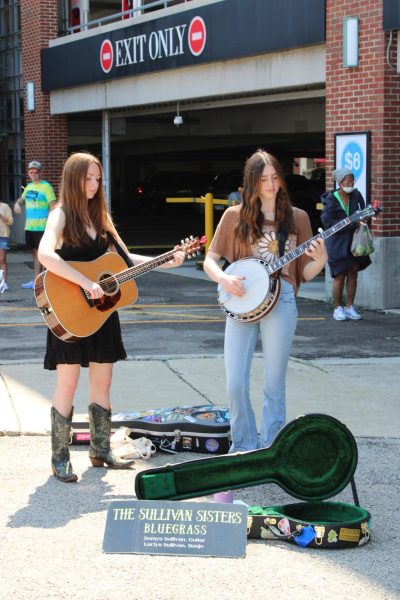For safety officer, job is to help, not to intimidate or penalize
At 8:00 am, bright and early, H-Hall is already flooded with students; groups with their heads together crowded in the lobby, down and up the stairs, lingering in front of lockers and classroom doorways. Who is it that greets them as they enter through Entrance One? Who is posted outside the main office and all throughout the building, in their blue and bright orange uniforms? The safety officers.
The safety department at ETHS has a lot on their shoulders—from dealing with spats in the North Wing to reports of weapons or drug use, and overall keeping everyone in and around the building safe. Often, students can be intimidated by safety staff, since they’re the ones who step in when kids are violating school rules or when dangerous situations break out. But there’s more to them than keeping order, of course. Most importantly, they care about this school and keeping everyone secure.
Necus Mayne is a safety officer, and an alumni of ETHS. He’s worked as a safety officer for 10 years, monitoring the halls from North to South to East wing. Most of the safety officers actually graduated from ETHS, Mayne says—as many as 75 to 80 percent of the staff.
“It means a little bit more for us when we come back to give back to the same school we graduated,” he says. “We take a lot of pride in our jobs, and a lot of pride in trying to help these kids navigate throughout the building.”
ETHS, like all schools, has had its fair share of difficulties–ranging from mere hallway fights to situations as intense as last year’s lockdown. But though there will always be students who don’t follow the regulations set in place, Mayne believes that the students and staff here care about keeping the school safe.
“For the most part, I have faith in the majority of the kids that go here to make the right decisions. Now, we understand kids make mistakes, and part of being an adult is trying to model for them how to kind of rebound from those mistakes,” he says. “[But] I think it’s a community job to keep schools safe. It doesn’t just come from the safety department. It comes from the students, it comes from the teachers.”
I think it’s a community job to keep schools safe. It doesn’t just come from the safety department. It comes from the students, it comes from the teachers.
— Necus Mayne
While it may take everyone that is a part of the school community to keep ETHS safe, safety officers are the ones who have to physically deal with rule violations. They are certified in CPR, CPI (non-violent crisis prevention) and AED through the American Red Cross, as well as FEMA-certified for crisis management. For any type of crisis de-escalation, especially when it’s physical, they’re prepared. But they never intervene in a fight without multiple units present and only after they’ve given verbal cues, Mayne discloses.
“I feel like usually when I speak, kids listen,” Mayne says. “But protocol is, you don’t intervene in a fight unless there are multiple units there to assist to basically restrain whoever the parties are.”
But the safety officers do more than just break up fights and monitor the hallways. They greet students at the doors every morning, scan their IDs at lunch, help track down their lost or stolen items, and generally make an effort to connect with the student body.
“[A lot of] the safety officers are very friendly and talk with students,” one student shares. “They break up fights, but they also help students to class. They look out for all of [us].”
As much as the safety officers do for this school, though, there are some things that are left in the hands of higher authority. When it comes to dealing with the bigger issues, like reports of a weapon or a lockdown, the EPD (Evanston Police Department) assists and guides the safety department. But because there are two SROs (School Resource Officers) on campus, they’re often already on the scene before the safety officers.
“I personally have not found any [items that violate school code,] but obviously, I have co-workers, if we do find something like that, we don’t touch it. We leave it for [the] EPD,” Mayne says. “If the tip is that the most extreme weapon is in the building, then the SROs are going to be involved.”
But when it comes to reports of drugs or a physical fight in the hallway, the safety officers take charge in those situations. During instances like basic searches because of a marijuana smell or a fight, an SRO might not be involved right away. In cases like that, the safety officers take the lead. While Mayne does believe that ETHS is a safe school, part of being a safety officer is always being prepared for the worst-case scenario or something to happen at the school. They have to be able to adapt to any situation, with the people’s safety in mind more than anything.
“Obviously from a safety standpoint, we’re always on our toes. You have to always expect the unexpected. That’s just a part of the job,” he says. “Anything could happen, anywhere, [on] any given day. That’s got to be the approach for someone in the safety department.”
You have to always expect the unexpected. That’s just a part of the job
— Necus Mayne
Mayne makes it clear, though, that safety isn’t in the position to reprimand students or hand out punishment; more than anything, their job is to ensure the student’s, and faculty’s, safety. Even if they’re the ones who go directly into the situations, they don’t partake in disciplinary action.
“Honestly, when we look at our jobs, we don’t have consequences or discipline,” Mayne voices. “That’s not our job; that really comes from the dean’s office. We look at our jobs mostly as being mentors and providing guidance to the kids that we can get through [to] on a daily basis.”
Many students can attest to feeling that guidance.
“I think it’s important for the safety officers to have this type of relationship with students,” one says. “It shows that safety officers are here to help [kids], not intimidate or penalize them.”
Of course, lots of students may not see that side. When they’re in the dean’s office because a safety officer found them violating school conduct, they may not recognize that they’re doing their job, but as the ones to rat them out to the administrators. Mayne understands the latter perspective but thinks it’s misguided.
“There’s a misconception about the department and what our jobs are like,” Mayne says. “We all have a vested interest in the success of our students. And I think it’s hard sometimes for a teenager to grasp that concept. When we come in, we might look like the bad guys. You know what I’m saying?”
“[But] we’re just doing our jobs–we want to make sure that everyone is safe,” he continues. “We have to step in and we [have] to make sure that that student gets help.”
Your donation will support the student journalists of the Evanstonian. We are planning a big trip to the Journalism Educators Association conference in Philadelphia in November 2023, and any support will go towards making that trip a reality. Contributions will appear as a charge from SNOSite. Donations are NOT tax-deductible.


